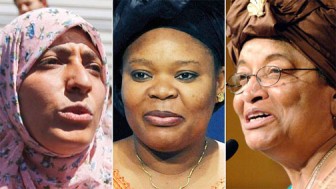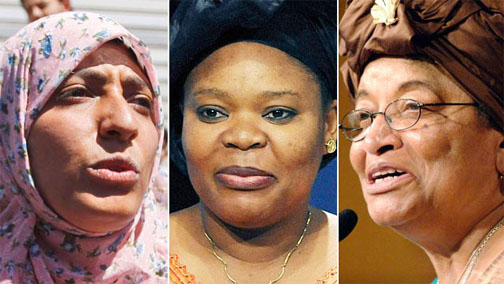OSLO (Reuters) – Declaring women’s rights vital for world peace, the Nobel Committee awarded its annual Peace Prize yesterday to three indomitable female campaigners against war and oppression — a Yemeni and two Liberians, including that country’s president.
Ellen Johnson-Sirleaf, the first woman freely elected as a head of state in Africa, shared the award worth $1.5 million with compatriot Leymah Gbowee, who promoted a “sex strike” among efforts to end Liberia’s civil war, and Yemen’s Tawakul Karman, who called her honour “a victory for the Arab Spring”.
“We cannot achieve democracy and lasting peace in the world unless women obtain the same opportunities as men to influence developments at all levels of society,” Norwegian Nobel Committee chairman Thorbjoern Jagland told reporters.
“This is to highlight an incredibly important issue all over the world but especially in Africa and in the Arab world.”
Karman, 32, an Islamist journalist dubbed the “Mother of the Revolution”, has been a key figure in protests in the capital Sanaa this year. “This is a victory for the Arab Spring in Tunis, Egypt, Libya, Syria and Yemen,” she told Reuters. “This is a message that the era of Arab dictatorships is over.”
Typically, the mother-of-three was out demonstrating in a central square in Sanaa for the departure of veteran Yemeni President Ali Abdullah Saleh when she heard the news.
Johnson-Sirleaf, 72, a former World Bank economist known as the “Iron Lady” by opponents, called the prize a recognition of her nation’s “many years of struggle for justice, peace, and promotion of development” since a brutal decade of civil war.
“The credit goes to the Liberian people,” she said in the capital Monrovia after hearing the announcement from Oslo.
Gbowee, 39, received the news belatedly when she switched on her mobile phone after landing in New York on a book tour.
“All I keep hearing in my head is the song of praise to God,” she said. “My work is for survival for myself and for other women … With or without a Nobel I will still do what I do because I am a symbol of hope in my community on the continent, in a place where there is little to be hopeful for.”
Her Women For Peace movement is credited with helping end Liberia’s war in 2003. Starting with prayers and songs at a market, she also urged wives and girlfriends of leaders of the warring factions to deny them sex until they laid down their arms.
 Liberian opposition leaders Winston Tubman and George Weah said Johnson-Sirleaf did not deserve the Nobel Prize and that awarding it to her was a “provocative intervention” in Liberian politics in the midst of a tight presidential election race.
Liberian opposition leaders Winston Tubman and George Weah said Johnson-Sirleaf did not deserve the Nobel Prize and that awarding it to her was a “provocative intervention” in Liberian politics in the midst of a tight presidential election race.
Jagland rejected suggestions that the panel’s decision might skew the election on Tuesday by giving Johnson-Sirleaf a boost in her bid for a second term.
But he called the award to Karman a signal to Arab autocrats that it was time to go, as well as a warning to new leaders, including Islamists, to protect women’s rights.
“If you look at the Arab Spring, this is a crucial issue,” Jagland told Reuters. “Unless they include the women in the development there, then they will fail … I am worried about what is going on in several of these countries.
“So this is a clear message to those who are trying to build democracy — that you have to take the women on board.”
Islamists have emerged strongly from the shadow of secular autocrats in Tunisia, Egypt and Libya and are well represented in opposition movements in Yemen, Syria and elsewhere. Jagland, a former Norwegian prime minister, said he was not criticising Islam but warning against abusing religion to oppress women.
The trio named by the Norwegian committee, whose other four members are all women, follow only a dozen women among 85 men to have previously won the prize over its 110-year history.
The panel hoped the award would help end “the suppression of women that still occurs in many countries, and to realise the great potential for democracy and peace that women can represent”.
The committee said all three women were rewarded from the bequest left by Swedish dynamite inventor Alfred Nobel for “their non-violent struggle for the safety of women and for women’s rights to full participation in peace-building work”.
“(This) is a recognition that while women pay the highest price in conflicts, they are equally leaders in peacemaking and rebuilding their nations,” said Graca Machel, a global advocate for women’s and children’s rights and the wife of former South African president and Nobel peace laureate Nelson Mandela.
“What has been acknowledged by this award is the leadership of women who insisted on coming out of conflict into peace … Their achievements show us how women in leadership roles can be powerful agents of change,” said Mary Robinson, a former Irish president and former UN high commissioner for human rights.
The prize was less controversial than in the last two years. In 2010, China was outraged and imposed sanctions on Norway after the award went to jailed dissident Liu Xiaobo.
The award to Barack Obama in 2009, just months after he became US president, amazed many, not least the new occupant of the White House. It recognised, among other things, promises he made of promoting democracy in the Arab world.
Many Arabs were disappointed by what they saw as Obama’s slowness in switching US allegiance this year from rulers like Egypt’s Hosni Mubarak and Yemen’s Saleh, an ally against al Qaeda, to the crowds of demonstrators trying to oust them.





